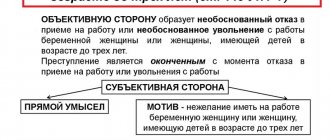To ensure that employees observe labor discipline, fulfill their job duties, and comply with labor protection requirements, labor legislation provides for both rewarding and punishing employees.
But since disciplinary sanctions are imposed by the employer himself, the legislation provides for a number of measures to prevent his abuses: the law strictly regulates the procedure and grounds for disciplinary liability, its types. Any employee can appeal a disciplinary sanction to the Labor Inspectorate, the prosecutor's office or the court.
Disciplinary liability as a type of legal liability
Disciplinary liability is a legal liability that occurs for an employee committing an unlawful act (disciplinary offense) and consists of imposing a disciplinary sanction by the employer.
The main features of disciplinary liability are: the procedure for involvement (extrajudicial) and the subjects (only employees in the order of subordination).
General and special responsibility
Such responsibility can be general or special:
- the general one is regulated by the Labor Code and applies to all employees.
- special is regulated by discipline provisions for certain categories of workers in certain sectors of the economy.
For example, in accordance with the Law on the Status of Military Personnel, they may be subject to such types of penalties as a severe reprimand, deprivation of the next dismissal from a military unit or from ship to shore, reduction in military position, reduction in military rank by one step, early dismissal from the military. service due to failure to comply with the terms of the contract, disciplinary arrest.
In relation to judges (RF Law of June 26, 1992 N 3132-1 “On the status of judges in the Russian Federation”), there are such disciplinary measures as reduction in qualification class, early termination of the powers of a judge.
Read more about the disciplinary liability of judges in the article of our partner - the portal “Zasudili.ru”
Grounds for disciplinary liability
The basis for bringing to disciplinary liability is the presence of elements in the act:
- subject (this is always an employee);
- object (values encroached upon by the offense);
- objective side (disciplinary offense in the form of action or inaction);
- subjective side (guilt in the form of intent or negligence).

Disciplinary offense
A disciplinary offense is characterized by the following main features:
- illegal act; - a guilty act (committed intentionally or carelessly); - work related.
According to the object of encroachment, disciplinary offenses can be divided into four groups:
- related to working hours (absenteeism, tardiness);
- destruction or damage to the employer's property;
- insubordination (failure to comply with orders, instructions of the employer);
- having a threat to life or health (violation of labor protection rules).
Types of penalties provided for by the Labor Code
According to Article 192 of the Labor Code of the Russian Federation, bringing an employee to disciplinary liability implies the application of the following sanctions:
- making a comment;
- issuing a reprimand;
- termination of the employment contract.
When imposing a disciplinary sanction, the severity of the offense committed and the circumstances under which it was committed must be taken into account.
IMPORTANT! For one violation, the employer can use only one measure of liability.
The Labor Code classifies two forms of this kind of liability: general and specialized. The first may involve citizens working on the basis of a concluded labor agreement.
Sanctions of specialized liability are valid for employees who are subject to both the terms of the employment contract and the requirements of the Federal Law. These include:
- employees of the judicial-executive system and the prosecutor's office;
- civil servants;
- railway transport employees;
- workers associated with the production and use of nuclear energy, etc.
IMPORTANT! In the case of specialized measures against the perpetrator, it is possible not only to impose work sanctions, but also administrative or criminal prosecution.
The procedure for applying disciplinary action. Disciplinary action.
In order to respect the rights of the employee, the procedure for applying disciplinary sanctions is strictly regulated.
Before applying a disciplinary sanction, the employer is obliged to request a written explanation from the employee. The employee has two days to do this. If he does not provide it, then an act is drawn up.
The employer approves the order to apply a disciplinary sanction , which the employee gets acquainted with signature within three working days. A report on the refusal is also drawn up.
When imposing a penalty, the severity of the offense, the circumstances of its commission, previous work and the behavior of the employee must be taken into account.
The employer may apply a disciplinary sanction within a month from the date of discovery of the misconduct, but no later than six months from the date of the commission of the misconduct. Based on the results of audits and inspections - within 2 years from the date of commission, for violation of anti-corruption legislation - 3 years.
The penalty can be appealed directly to the labor dispute commission, the Labor Inspectorate and the court within 3 months or 1 month (dismissal).
After one year from the date of issuance of the order, the disciplinary sanction is lifted. The employer, taking into account the employee’s behavior, can remove it earlier.
Disciplinary liability: concept and types of penalties. Disciplinary proceedings
In the course of their professional activities, employees often commit certain violations of labor discipline, which may constitute a disciplinary offense.
To suppress and prevent such offenses, the employer must be aware of possible disciplinary measures and the procedure for imposing it on an employee: when there is the right to dismiss him, and when it is necessary to limit himself to a less severe punishment. Issues of applying disciplinary sanctions are proposed to be considered in this article. Disciplinary sanctions In general, liability in labor law is the obligation of a participant in a social-labor relationship to suffer the adverse consequences of committing an action or inaction that causes harm to another participant in the legal relationship. A type of liability applied within the framework of labor law is disciplinary liability, which is understood as the obligation of an employee to answer for a disciplinary offense committed by him and to bear the penalties provided for by labor legislation. The basis for bringing to disciplinary liability is the commission of a disciplinary offense. In accordance with Art. 192 of the Labor Code of the Russian Federation, a disciplinary offense can be defined as the failure or improper performance by an employee, through his fault, of the labor duties assigned to him. The object of a disciplinary offense, that is, those social relations that are violated as a result of its commission, is the internal labor regulations. According to the object, disciplinary offenses can be divided into four groups: – encroachments on the full use of working time (absenteeism, tardiness); – encroachments on the careful and proper use of the employer’s property; – encroachments on the order of management of production processes in the organization (failure to comply with orders, instructions); – encroachments that create a threat to the life, health, morality of an individual employee or the entire workforce (violation of labor protection rules). On its objective side, a disciplinary offense can be expressed in the unlawful failure or improper performance by an employee of his labor duties, that is, it can be either an action or an inaction. In some cases, for the emergence of an offense, the presence of consequences in the form of harm and, accordingly, a causal connection between the act and the consequences is required. As for the subjective side, there must be guilt, in any form - intent or negligence. Failure by an employee to fulfill labor duties for reasons beyond his control is not a labor offense. The subject of a disciplinary offense is always the employee. Unlike a crime, a disciplinary offense is not characterized by a social danger, but is a socially harmful act. As a consequence, it entails the application of disciplinary measures. Article 192 of the Labor Code of the Russian Federation provides for the following types of disciplinary sanctions: – reprimand; – reprimand; – dismissal for appropriate reasons. At the same time, it is indicated that federal laws, charters and regulations on discipline for certain categories of employees may also provide for other disciplinary sanctions. The application of disciplinary sanctions not provided for by federal laws, charters and regulations on discipline, that is, local regulations, is not permitted. All disciplinary measures are imposed by the employer. The most severe, extreme disciplinary measure is dismissal. It is possible in the following cases: 1) repeated failure by an employee to fulfill work duties without good reason , if he has a disciplinary sanction ( clause 5 of Article 81 of the Labor Code of the Russian Federation ); 2) a single gross violation of labor duties by an employee ( clauses 6 , 9 and 10 of Article 81 , clause 1 of Article 336 and Article 348.11 of the Labor Code of the Russian Federation ), namely: – absenteeism (absence from work without good reason for more than four hours in a row during the working day); – appearing at work in a state of alcohol, drug or other toxic intoxication; – disclosure of secrets protected by law (state, commercial, official and other) that became known to the employee in connection with the performance of his job duties; – committing at the place of work theft (including small) of someone else’s property, embezzlement, intentional destruction or damage, established by a court verdict that has entered into legal force or a decision of a judge, official, body authorized to consider cases of administrative offenses; – determination by the labor safety commission or the labor safety commissioner of a violation by an employee of labor protection requirements, if this violation entailed serious consequences (industrial accident, breakdown, catastrophe) or knowingly created a real threat of such consequences. In addition, dismissal is possible under clauses 7 and 8 of Part 1 of Art. 81 of the Labor Code of the Russian in cases where guilty actions giving grounds for loss of trust and an immoral offense, respectively, were committed by an employee at the place of work and in connection with the performance of his job duties. Separate grounds for dismissal at the initiative of the employer are provided for the heads of the organization, his deputies and the chief accountant ( clauses 9 and 10 of Article 81 of the Labor Code of the Russian Federation ): - making an unfounded decision that entailed a violation of the safety of property, its unlawful use or other damage to the property of the organization; – one-time gross violation of labor duties. The procedure for applying disciplinary sanctions The procedure for bringing to disciplinary liability is regulated by Art. 193 Labor Code of the Russian Federation . Based on labor legislation, the following stages of disciplinary proceedings can be distinguished. Initiation of disciplinary proceedings. The employer interviews witnesses and gets acquainted with the proposal to bring the employee to disciplinary liability, received from a person who does not have the right to impose disciplinary measures. The employer must request a written explanation . If after two working days the employee has not provided the specified explanation, then an act of refusal to give written explanations is drawn up. Failure by an employee to provide an explanation is not an obstacle to applying disciplinary action. The manager’s choice of a specific method of influencing the offender and making a decision. When imposing a disciplinary sanction, the severity of the offense committed and the circumstances under which it was committed must be taken into account. The following rules must be observed: - disciplinary sanction is applied no later than one month from the date of discovery of the misconduct , not counting the time of illness of the employee, his stay on vacation, as well as the time necessary to take into account the opinion of the representative body of employees. The day the misconduct was discovered is the day when the immediate supervisor became aware of the misconduct, regardless of whether he had the right to apply disciplinary measures; – a disciplinary sanction cannot be applied later than six months from the date of commission of the offense , and a penalty based on the results of an audit, inspection of financial and economic activities or an audit – later than two years. The specified time limits do not include the time of criminal proceedings; – for each disciplinary offense only one disciplinary sanction can be applied . Issuing an order (instruction) and bringing to disciplinary liability. The employer's order (instruction) to apply a disciplinary sanction is announced to the employee against signature within three working days from the date of its publication, not counting the time the employee is absent from work. If the employee refuses to familiarize himself with the order (instruction) against signature, then a corresponding act is drawn up. A disciplinary sanction can be appealed by an employee to the state labor inspectorate and (or) bodies for the consideration of individual labor disputes. Removal of disciplinary action. A disciplinary sanction is valid for one year from the date of application . If within a year from the date of application of the disciplinary sanction the employee is not subjected to a new disciplinary sanction, then he is considered to have no disciplinary sanction, that is, it is automatically removed (without any special orders). The employer, before the expiration of a year from the date of application of a disciplinary sanction, has the right to remove it from an employee on his own initiative, at the request of the employee himself, at the request of his immediate supervisor or a representative body of employees (early removal of a disciplinary sanction). A corresponding order is issued regarding the early lifting of a disciplinary sanction. Circumstances that need to be checked when imposing a disciplinary sanction When imposing a disciplinary sanction, it is necessary to clarify the following circumstances: - what the offense was expressed in and whether this can be a basis for imposing a disciplinary sanction; – whether the offense was committed without good reason; – whether the performance of actions that the employee did not perform (performed improperly) was within the scope of his duties and what document provided for these duties; – whether the employee is familiar with the local act, which stipulates the corresponding responsibilities, against signature; – whether the disciplinary measures applied to the employee are provided for by law or regulations or charter on discipline; – whether the terms and procedure for imposing disciplinary sanctions have been observed; – whether the penalty was imposed by the same official. Disciplinary action can only be imposed by the supervisor. Other persons can impose penalties only on the basis of documents that specifically state such powers. Features of bringing to disciplinary liability the head of the organization, the head of the structural unit, their deputies at the request of the representative body of employees The employer is obliged to consider the application of the representative body of workers about the violation by the head of the organization, the head of the structural unit, their deputies of labor legislation and other acts containing labor law, collective conditions contracts, agreements and report the results of its consideration to the representative body of workers. If the violation is confirmed, the employer must apply disciplinary action to the head of the organization, the head of the structural unit, and their deputies, up to and including dismissal. Dismissal as a disciplinary measure Cases where a disciplinary offense may lead to dismissal are clearly regulated. In practice, it happens that an employer tries to fire an unwanted employee on these grounds. This may lead to the dismissal being declared illegal and, accordingly, compensation to the employee for forced absence. Let's consider when a disciplinary measure such as dismissal can be applied in more detail. Clause 5 of Art. 81 of the Labor Code of the Russian Federation provides for termination of an employment contract for repeated failure by an employee to fulfill work duties without good reason, if he has a disciplinary sanction . Dismissal on this basis will be lawful if the following circumstances exist simultaneously: 1) the employee has a disciplinary sanction for the last working year, it has not been removed or repaid, there is an order (instruction) to impose a disciplinary sanction; 2) the employee committed a disciplinary offense, that is, a labor offense - did not fulfill his labor duties without good reason; 3) the employer requested from the employee a written explanation of the reasons for the labor offense no later than one month from the date of discovery of the offense and six months from the date of its commission (two years for an audit); 4) the employer took into account the employee’s previous behavior, his many years of conscientious work, and the circumstances of the offense. The dismissal order in this case must indicate as a basis the numbers and dates of orders on previously imposed disciplinary sanctions, the essence of the offense, the date and circumstances of its commission, consequences, absence of valid reasons, absence (presence) of an explanation from the employee. It is also necessary to make a reference to documents confirming the commission of the offense. The dismissal of trade union members is carried out taking into account the opinion of the trade union. Other disciplinary measures cannot be applied. Clause 6 of Art. 81 of the Labor Code of the Russian Federation provides as a basis for dismissal the commission of a single gross violation of labor duties by an employee and indicates five possible options for such violations. The list is exhaustive and is not subject to broad interpretation. For all five subparagraphs of paragraph 6 of Art. 81 of the Labor Code of the Russian Federation, the terms and rules for imposing disciplinary sanctions must be observed ( Articles 192 and 193 of the Labor Code of the Russian Federation ). In paragraph 6 of Art. 81 of the Labor Code of the Russian Federation provides for the following grounds for dismissal. Firstly, this is absenteeism ( paragraph “a” ), that is, absence from the workplace without good reason throughout the entire working day (shift), regardless of its duration, as well as absence from the workplace without good reason for more than four hours in a row during a working day (shift). Thus, the Labor Code of the Russian Federation has given a more stringent definition of absenteeism than it was before. Dismissal on this basis can be made, as stated in the Resolution of the Plenum of the Armed Forces of the Russian Federation dated April 17, 2004 No. 2 ( clause 39 ), for the following violations: a) leaving work without a good reason by a person who has entered into an employment contract for an indefinite period, without warning the employer on termination of the employment contract, as well as before the expiration of the two-week warning period (see Article 80 of the Labor Code of the Russian Federation ); b) absence from work without good reason, that is, absence from work throughout the entire working day (shift), regardless of the length of the working day (shift); c) the employee stays outside the workplace without good reason for more than four hours in a row during the working day; d) unauthorized use of time off, as well as unauthorized going on vacation (main, additional). Often, dismissal for absenteeism is associated with the employee’s refusal to start work to which he has been transferred. But if the transfer to another job was carried out in violation of the transfer rules, such a refusal cannot be qualified as absenteeism. When the court reinstates an employee who was illegally dismissed for absenteeism, payment for forced absenteeism is made from the day the dismissal order is issued: only from this time is absenteeism forced. Usually, the court considers valid reasons for an employee’s absence from the workplace to be confirmed by documents or testimony: – illness of the employee; – delay of transport in case of an accident; – passing exams or tests without proper registration of study leave; – floods and fires in the apartment and other circumstances. Subparagraph “b” of paragraph 6 of Art. 81 of the Labor Code of the Russian Federation provides for such grounds for dismissal as appearing at work in a state of alcohol, narcotic or other toxic intoxication . An employee who appears at any time of the working day (shift) in a state of intoxication, the employer is obliged to suspend from work on that day (shift). The removal of an employee is formalized by order. If the employee was not suspended from work, evidence of this basis is a medical report, a report drawn up at that time, witness testimony and other evidence under the Code of Civil Procedure of the Russian Federation. In any case, it is necessary to draw up an act on the commission of such a disciplinary offense, as required by the general rules for bringing to disciplinary liability. Subparagraph “c” of paragraph 6 of Art. 81 of the Labor Code of the Russian Federation introduced a new basis for dismissal, classified as gross violations - disclosure of secrets protected by law (state, commercial, official, etc.) that became known to the employee in connection with the performance of his job duties, including disclosure of personal data of another employee. An employer can fire an employee for a one-time offense of this kind. Since the vast majority of employees do not know what is considered a commercial or official secret, much less any other secret, employers can abuse this basis for dismissal. Therefore, additional clarification is required on this issue - in particular, are all employees of the organization responsible for the non-disclosure of commercial or official secrets or only those whose employment contracts indicate the corresponding condition, whether what is specified in the organization’s charter is a secret protected by law, etc. d. Subclause “d” of clause 6 of Art. 81 of the Labor Code of the Russian Federation contains such grounds as the theft (including small) of someone else’s property at the place of work, its embezzlement, intentional destruction or damage, established by a court verdict that has entered into legal force or a resolution of the relevant administrative body (police, for example). If there are no such documents, and there is only, say, a report from a watchman about an attempt to remove production products, the employee cannot be fired on this basis, otherwise the court, when considering a dispute over dismissal, will reinstate him at work, that is, the fact of theft must be established by the competent authorities. The month for dismissal in this case is calculated from the moment the court verdict enters into force or a decision of another competent authority. Subparagraph "d" paragraph 6 of Art. 81 of the Labor Code of the Russian Federation, as a basis, is provided for the establishment by the Commission on Labor Protection or the Commissioner for Labor Protection by the employee of labor protection requirements, if this violation entailed grave consequences or obviously created a real threat to the onset of such consequences . Graceful consequences include an accident in production, accident, disaster. But the consequences indicated here or the obviously real threat of their occurrence should prove the employer in court when considering the dispute in court. In addition to the already named, paragraph 7 of Art. 81 of the Labor Code of the Russian Federation enshrines the ability to dismiss an employee directly serving cash or commodity values for the performance of guilty actions that give the basis for the loss of trust in him by the employer . On this basis, only an employee who directly serves monetary or commodity values can be dismissed, regardless of what type of liability (limited or complete) is assigned to him. On the vast majority, these are the so -called financially responsible persons (according to the law or under the contract), that is, sellers, cashiers, warehouses, etc. (cannot be attributed to them: they protect the material values located under the castle). The employer must prove the distrust of the employee with facts (acts on leaps, carrying, shortage, etc.). Clause 8 Art. 81 of the Labor Code of the Russian Federation provides for the dismissal for the commission by an employee performing educational functions, an immoral misconduct , incompatible with a continuation of this work. Amoral is an an misconduct that contradicts the generally accepted morality (the appearance in public places is in a state of intoxication, obscene abuse, a fight, humiliating human dignity behavior, etc.). The misconduct can be committed in everyday life (for example, the teacher beats his wife, tortures his children). It should be noted that the training and auxiliary personnel on this basis cannot be dismissed. It is necessary to establish the fact of misconduct and circumstances that impede labor activity. Clause 9 of Art. 81 of the Labor Code of the Russian Federation establishes the employer’s right to dismiss the heads of the organization (branch, representative office), their deputies and chief accountants for their adoption of an unreasonable decision, which entailed a violation of the safety of property, its unlawful use or other damage to the property of the organization . However, the unreasonableness of the solution is a subjective concept, and in practice it is evaluated by the employer (single -handed or collegial). If the employee by his decision prevents possible more harm to the property of the organization, such a decision cannot be considered unreasonable. If the situation indicated in paragraph 9 of the situation occurs, the employer must prove the guilt of the employee in a labor dispute. Dismissal on the specified basis is a disciplinary sanction, therefore, the previously described rules should be observed under it. Clause 10 of Art. 81 of the Labor Code of the Russian Federation considers as the basis of the dismissal of the heads of organizations (branch, representative office), their deputies, chief accountants one -time gross violation of their labor duties . It is also a disciplinary dismissal in which the rules of Art. 193 of the Labor Code of the Russian Federation . The question of whether the violation is rude is decided by the court, taking into account the specific circumstances of the case. At the same time, the obligation to prove that such a violation in reality took place and was rude, lies on the employer. In accordance with paragraph 49 of the Resolution of the Plenum of the Armed Forces of the Russian Federation of 17.03.2004 No. 2 as a gross violation of labor duties by the head of the organization (branch, representative office), his deputies should, in particular, should regard the failure to fulfill the duties assigned to these persons, which could entail the causing harm to the health of workers or causing property damage to the organization. Clause 1 of Art. 336 of the Labor Code of the Russian Federation establishes the right to dismiss the teacher for repeated during the year a gross violation of the charter of the educational institution . In addition, as athletes who committed a disciplinary offense athletes for sports disqualification for a period of six or more months , as well as for the use, including single, doping means and (or) methods identified during doping control in the manner established in accordance with federal laws ( Article 348.11 of the Labor Code of the Russian Federation ).








